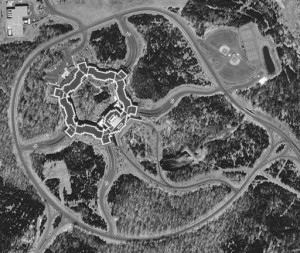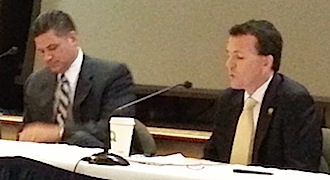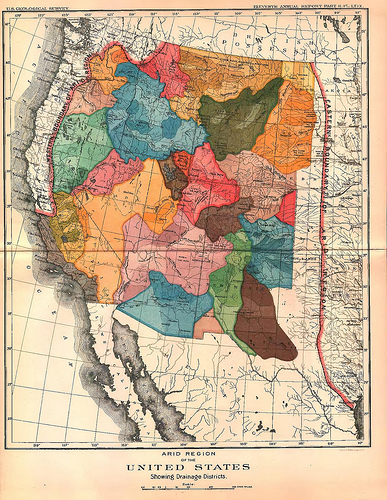New Jersey Future Blog
The Coming Boom in White Elephants
January 2nd, 2013 by Elaine Clisham

Aerial view of Merck’s headquarters in Whitehouse Station, N.J. The company has announced it is relocating its headquarters to its more transit-accessible facility in Summit. Source: USGS
We’ve been hearing recently about how malls, both strip and enclosed, have passed their prime. Mall facilities, largely constructed in the 1970s and 1980s, are now outdated and starting to become dilapidated. Vacancy rates are increasing, and, rather than bringing anticipated enhancement to their host municipalities they are becoming eyesores, much in need of a re-imagining.
In New Jersey, another kind of commercial property is going through a similar decline – the suburban office park. A new report in the Regional Report series from the Bloustein School of Planning and Public Policy at Rutgers, Reinventing the New Jersey Economy: New Metropolitan and Regional Employment Dynamics, highlights the problem of these “white elephants” and asks some good questions about how best to address it.
The problem has arisen, according to the report, out of the twin dynamics of the changing nature of knowledge-based work and what the report calls “unexpected suburban lifestyle fatigue.” New Jersey has historically been a magnet for technology and other knowledge workers, recruited during the 1980s away from deteriorating cities to sparkling suburban work environments where land was cheap and houses and roads were new. Thirty years later these workers are beginning to retire out of the workforce, and their Millennial-generation replacements have little affection for low-density suburban living, especially now that these facilities are starting to show their age, the roads that must be traveled to reach them are falling increasingly into disrepair, and the cost of gas keeps rising. Living in the suburbs has become expensive. Thus the growing demand among knowledge workers is for compact, walkable mixed-use areas, where jobs and entertainment are easily accessible without a car. Since there tends to be a chronic shortage of high-skill workers, employers are paying attention to their locational preferences.
The Rutgers report makes a convincing case that this will occur more and more frequently, and that suburban office parks and corporate campus locations will languish vacant in increasing numbers. It warns that these facilities could become this century’s corollary to the problem of vacant industrial buildings of the 1970s and 1980s, but without the locational benefits.
The report asks important questions about how best to address this looming problem: Can some of these facilities, especially the locationally advantageous ones, be retooled? How can they be re-imagined so that they become attractive places for a highly desirable workforce?
Unfortunately, all the questions carry the same underlying assumption: that these places will continue to be employment centers. The report assumes these facilities will be reborn as office parks, just an updated, environmentally friendly co-working version of them.
This is not always the best solution. An employment facility sited on a former horse farm, away from both easy access to transit and proximity to other similar employers, will need to overcome some steep negatives if it is going to attract Millennial knowledge workers. Recruitment and retention will be expensive. And while the state needs jobs, throwing job-creation incentives at locations such as these in an effort to keep them productive despite countervailing market forces seems like far less than the most efficient, effective use of scarce state resources.
It’s not clear yet what the best options are for these aging employment centers, but the exploration of that problem should not be tied to the state’s eagerness to generate jobs. We should be helping to generate jobs in locations that match the criteria of the highest-skill workers – compact, mixed-use, transit-accessible – and we should be examining the problem of suburban white elephants as an unrelated exercise.
















